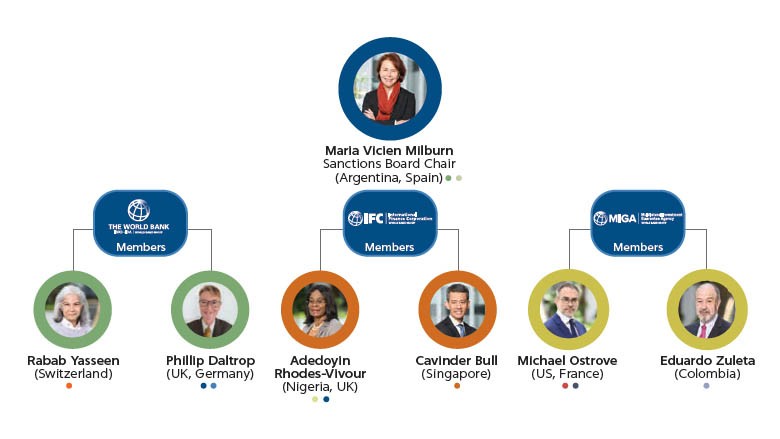The sanctions system is a key component of the World Bank Group's anti-corruption efforts. It plays an important role by ensuring accountability once fraud, corruption, or other misconduct is detected. To date, the Sanctions Board has issued 139 decisions reviewing allegations of sanctionable misconduct in Bank-funded projects. Through its decisions and imposition of sanctions, the Sanctions Board has created a body of jurisprudence internationally respected and relied upon by other Multilateral Development Banks. Since its creation in 2007, the Sanctions Board has evolved in the following notable respects.
Independence and Impartiality is the cornerstone of the Sanctions Board's work. The external 2002 Thornburgh Report recommended measures to promote fairness and efficiency in reviewing allegations of sanctionable misconduct. Since then, the Sanctions Board has transitioned from an all-internal body to a board composed of only external members. This renewed sanctions framework emphasizes the independence and impartiality of key decision makers.

Deterrence and Rehabilitation is the main goal of sanctions. In 2011, the baseline sanction changed from debarment (ineligibility from participation in WBG projects) to debarment with conditional release. This means that before being released from debarment, entities and individuals must meet certain "conditions," such as improving corporate relevant integrity compliance programs and policies. Consequently, over the past 15 years, the percentage of decisions that imposed fixed-term or permanent debarment fell in favor of decisions that impose debarment for a finite period once certain conditions are met. In this respect, the Sanctions Board aims to ensure that public sanctions not only deter future misconduct but that entities and individuals implement higher standards of integrity so they become better business partners.
Transparency and Dialogue build trust. In 2012, the Sanctions Board began publishing fully reasoned decisions. The Sanctions Board also issues a periodic Law Digest that summarizes its jurisprudence. This transparency and level of detail are unmatched among the multilateral development banks. The Sanctions Board and its Secretariat take the lead in engaging in regular dialogue and conferences with similar mechanisms at other multilateral development banks and international bodies.
Harmonization. Since 2006, multiple International Financial Institutions (IFIs) have joined the WBG in harmonizing evolving standards and recommendations regarding integrity, sanctions, and debarment. This collective action resulted in many achievements, including the 2010 Cross-Debarment Agreement which provides a mechanism for certain IFIs, including the World Bank Group, to recognize each other's debarments. This global united front in the fight against corruption resulted in raising the stakes for bad actors deciding to engage in misconduct.
As the Sanctions Board continues in its 16th year of operation, it is exciting to see how the system continues to evolve and respond to the needs of the time. More than ever, corruption is a pressing problem that stymies the Bank's efforts to reach its development goals. As the sanctions system reviews more and more allegations, we will continue to learn how debarment and other sanctions impact the private sector, how the WBG is affecting business integrity standards around the world, and even how some bad actors may try to evade responsibility. The system's agility is an intended feature; and the Sanctions Board's contributions and jurisprudence will continue to support and inform the development of this important anti-corruption mechanism.
For more about the Sanctions Board, https://www.worldbank.org/en/about/unit/sanctions-system/sanctions-board